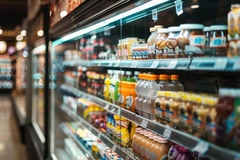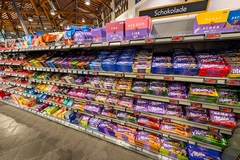
- Industry news
Industry news
- Category news
Category news
- Reports
- Key trends
- Multimedia
- Journal
- Events
- Suppliers
- Home
- Industry news
Industry news
- Category news
Category news
- Reports
- Key trends
- Multimedia
- Events
- Suppliers
Puratos Invests 21 Million Euro in Sourdough Production

The new unit is part of the group’s bio-fermentation centre and offers top level employment for experts in the field. The objective is to accurately reproduce, on an industrial scale, the traditional baker’s methods of preparing sourdough.

Oct 25 2010 --- Puratos, an international group of Belgian origin specialising in the manufacture of raw materials for bakers, pastry chefs and chocolatiers, has just launched a new production unit for natural sourdoughs. Located at the group’s Andenne site (near Namur, Belgium), it represents an investment of 21 million euro. The new unit is part of the group’s bio-fermentation centre and offers top level employment for experts in the field.
The objective is to accurately reproduce, on an industrial scale, the traditional baker’s methods of preparing sourdough. It is, in fact, the quality of the sourdough that determines the great flavour of bread. But the production of a good sourdough is not something that everyone can achieve.
Few bakers still prepare sourdough the traditional way. Besides being a time-consuming task requiring considerable expertise, the outcome cannot be guaranteed as it relies on many parameters such as flour quality, the water, ambient temperature and so forth. This explains why the majority of bakers have replaced sourdough starters with yeast - much easier to handle even if it does not compare from a flavour perspective.
Accurately reproducing the methods of the bakers of yesteryear
Several studies conducted by the Puratos group in the 90s found that consumers, including young people, prefer the taste of the good bread of yesteryear. Puratos initiated an extensive research programme that led to the creation of the ‘Sapore’, meaning flavour in Italian, range of natural sourdoughs. These leavens are based on lactic acid bacteria - the micro-organisms responsible for triggering fermentation - specific to particular countries. This explains why some yoghurts, cheeses and beers can only be produced in particular regions of the world.
Puratos’ researchers succeeded in isolating and preserving these strains of micro-organism and incorporating them into the starter doughs using a unique process that ensures uniformity of flavour in a natural sourdough.
The investment in Andenne complements the other Puratos group sourdough factories in Saint-Vith, near the German border in Belgium, and in Cherry Hill, near Philadelphia in the United States. Production lines at these three factories faithfully reproduce the methods of traditional bakers and respect the traditional fermentation times. Where the two worlds diverge lies in the fact that Puratos disposes of a ‘library’ that contains the best micro-organisms of the world, allowing it to produce a variety of leavens unimaginable just a few years ago.
To produce the starter dough, the cereal flour is first mixed with water then with the particular lactic acid bacteria that will lead to the desired result. This triggers fermentation. After a pre-defined time, the leaven needs to be ‘refreshed’: more flour and water is added and the dough lightly kneaded. This process is repeated several times until the leaven has reached the desired maturity. For some types of sourdough, this process can continue for several days.
At Andenne, liquid leaven is dried on drums often at temperatures of over 150°C. It flows over the drum and forms a fine film scraped off with knives, which is then ground to obtain its final powder form. The drying process caramelises the sugars in the flour and gives the leaven a toasted flavour. These products have an exceptionally rich aroma. A baker can create unique flavours by adding these natural sourdoughs to his dough and thus benefit from expertise founded on years of research.
In addition to the usual manufacturing tests and controls, each new product is studied in one of the group’s sensory analysis laboratories. A panel of professional tasters ensures that the sourdough starters give breads the rich organoleptic qualities that bakers and consumers have the right to expect.
Andenne: a total investment of over 100 million euro
Puratos opened its Andenne plant in 1994 and located its bio-fermentation competency centre there. The group set up research laboratories employing high-level staff as well as an enzyme production unit for breadmaking. Since enzyme production is based on the fermentation of sugar, Puratos chose Andenne for its association with the sugar industry.
In the second phase, Puratos installed production units for yeast and yeast extracts. The yeast is manufactured from molasses, a by-product of sugar beet. Finally, in its third phase of development in Andenne, Puratos embarked on the production of drum dried sourdoughs. For this, the group invested 21 million euros in a new natural sourdoughs production unit, thereby confirming the strategic importance of the Andenne centre.
The three-phase development represents a total investment of over 100 million euros. From a staff of 20 in 1994, the number of personnel now exceeds 130. Puratos offers the region outstanding job quality and stability for a wide range of skill profiles related to the food sector.
The Andenne site is certified BRC, grade A – the highest in the category - assuming that Puratos ceaselessly strives to improve the quality of its products and build on the loyalty of its customers.










